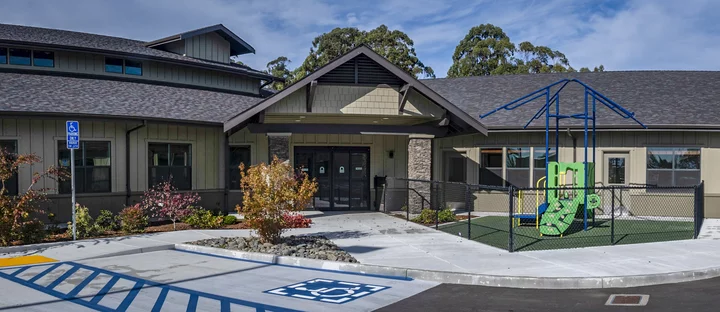The Center, a multi-agency facility led by the nonprofit McKinleyville Family Resource Center, opened its doors in April. The McKFRC will soon administer a guaranteed basic income program for local residents. | Submitted
A hundred and fifty Humboldt County residents will soon receive monthly payments of $1,000 cash for a year and a half, no strings attached, as part of a state-funded guaranteed basic income pilot program, the first of its kind in California.
Last Monday, the California Department of Social Services announced its intention to award more than $25.5 million in grant funding to seven pilot programs, six of which will be managed by nonprofits in major metropolitan areas. The seventh will be run by the McKinleyville Family Resource Center, whose program manager and interim co-executive director, Robin Baker, was ecstatic to learn that her organization had been selected to receive an award of $2,354,841.
“I was blown away,” she said in a phone interview this morning. “I cried tears of joy for the first time in my life.”
The McKFRC, whose mission is to support, enrich and sustain healthy community life, has yet to iron out the program’s eligibility details, but broadly speaking they plan to give out 18 monthly payments of $1,000 apiece to 150 local Medi-Cal recipients who are in their first or second trimester of pregnancy at the time of qualification.
Baker said the McKFRC will work with various partner organizations over a six-month period to design the enrollment and disbursement processes. Those groups include Open Door Community Health Centers, the Humboldt County Department of Health and Human Services, North Coast Regional Department of Child Support Services, United Indian Health Services and the Trinidad Rancheria, among others.
This kind of collaborative effort played a key role in the development of The Center at McKinleyville, which opened its doors in April after a decade of planning, Baker said. Led by the McKFRC, The Center allows northern Humboldt residents to access services from a variety of partner organizations, including most of those mentioned above.
Local service groups, government and tribal agencies also helped the McKFRC in its bid for the guaranteed income grant award, submitting enthusiastic letters of support that vouched for the organization’s track record of helping rural families.
While Baker was happily surprised by the grant award, she also sees how impactful the program can be in addressing some of our region’s specific challenges. In applying for the grant, the McKFRC noted that Humboldt County’s rates for nearly all leading causes of death are two-to-three times the state average. Native Americans here die an average of 12 years sooner than Caucasians, in part due to disproportionately high rates of serious health conditions, drug related deaths and trauma.
The concept of guaranteed income payments has gained traction in California and beyond following a 2019 pilot program led by former Stockton Mayor Michael D. Tubbs. In that city, 125 randomly selected residents received payments of $500 per month for 24 months.
Researchers analyzing the results found that participants were healthier, happier and less susceptible to the kinds of month-to-month income fluctuations many households face. What’s more, the program actually boosted employment rates among recipients, alleviating their financial scarcity and allowing them greater self-determination.
Sacramento adopted a similar program in January, and in July 2021 California lawmakers unanimously approved the first state-funded guaranteed income plan in the U.S. The program is designed to help qualifying expectant mothers as well as young adults who recently left foster care.
“Our original proposal was to serve 275 people,” including locals who are aging out of foster care, Baker said. But after submitting the application, McFRC was contacted by state officials who asked if they’d consider limiting the program to pregnant applicants.
“We said, ‘Yes, absolutely,’” Baker recalled.
There’s still a lot of work to be done before the payments can begin.
“We’ll have a six-month planning time, and we need to secure a $1.2 million philanthropic match,” Baker said. A group of organizations has already expressed interest in supporting a guaranteed income program, including The California Endowment, Sierra Health Foundation, The James Irvine Foundation and Blue Shield of California. The McKFRC is also partnering the Humboldt Area Foundation to identify potential local sources of funding. (Baker said the McKFRC will welcome donations, too. People can specify that it should go to the guaranteed income pilot program.)
“We feel confident that we will be able to do [raise the $1.2 million], and it’s a big lift,” Baker said. She explained that the direct $1,000 payments need to come from a combination of state and philanthropic funding so recipients don’t lose eligibility for their state benefits. The McKFRC also wants to ensure that the money gets delivered in a way that’s accessible to people who may not have bank accounts — so potentially via prepaid cards or checks.
The six-month planning period will be followed by a six-month enrollment phase, and Baker said the McKFRC plans to prioritize applicants who are Black, Indigenous and people of color (BIPOC).
“Because we’re the only rural [recipient of] funding, I think a lot of people will be watching to see what the impact is,” Baker said.
The results could wind up informing policymakers across the country and potentially expand the proliferation of guaranteed basic income programs, which garnered a lot of attention and support when proposed by 2020 presidential candidate Andrew Yang. Baker’s excited about the potential.
“It’s a wonderful opportunity for Humboldt County to tell our story on a large scale and to impact people nationwide,” she said.

CLICK TO MANAGE